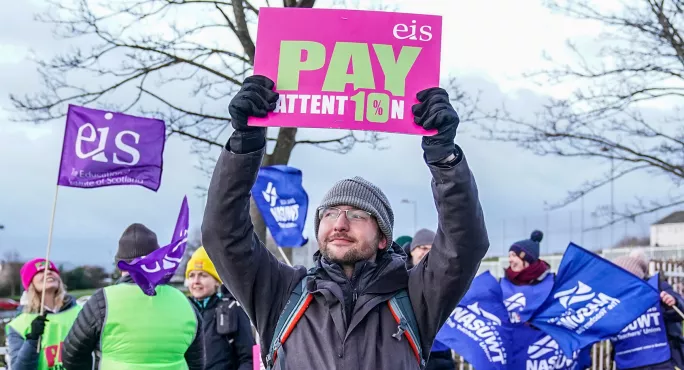Secondary heads play down impact of strike action on exams

Scotland’s secondary headteachers’ organisation has played down fears that today’s strike action will have an impact on the preliminary exams that typically take place in schools after the Christmas holidays.
Jim Thewliss, general secretary of School Leaders Scotland (SLS), said that because headteachers were aware of today’s walkouts before the Christmas holidays, they were able to reschedule the tests.
However, he also said that some secondary schools were still managing to run prelims because of the make-up of union membership in them, and also because those who supervise students during exams are not always teachers.
- Scottish teacher pay strikes: Deal still “some distance” away
- Related: New strike laws will “inflame” disputes, warns EIS boss
- Flashback to November: Video report from Edinburgh rally after historic teacher pay strike in Scotland
Mr Thewliss said: “Prelim disruption hasn’t really arisen as an issue because schools had plenty of warning. They knew what day the strike was going to be and which staff were not going to be there.
“I’ve spoken to some schools actually going ahead with their prelims because there are still enough staff in school to run them and because invigilators are often not teachers anyway.”
Secondary schools across Scotland are closed today as teachers take industrial action in a pay dispute, after teachers at primary schools walked out yesterday.
Teacher strikes over pay set to continue
Some secondary headteachers will be involved in today’s industrial action but - unlike members of primary leaders’ body AHDS, who joined striking primary teachers yesterday - SLS members will be in work today.
Although 69 per cent of SLS members who voted in a ballot last year were in favour of striking, this was based on a turnout of just 38 per cent. Legislation requires at least a 50 per cent turnout for a trade union ballot on industrial action to be successful.
The strikes yesterday and today come after last-ditch talks between the Scottish government, councils and unions failed to find a solution.
Unions have demanded a 10 per cent pay increase but the Scottish government has offered 5 per cent, including rises of up to 6.85 per cent for the lowest-paid staff.
Mike Corbett, NASUWT Scotland national official, said some schools had had to shift prelim exams but he added that he had “not heard of that posing any particular problems for these schools”.
“As we’ve said all along, I don’t think any of our members want to be out on strike today, but despite some talks and pay negotiations there’s still no revised pay offer on the table. It’s the same offer as in November, and they feel pushed into a corner,” he said.
Education secretary Shirley-Anne Somerville yesterday said she will leave “no stone unturned” to bring about a quick resolution to the teacher strikes.
Mr Corbett said: “We noted the cabinet secretary’s statement to the Scottish Parliament about leaving no stone unturned in seeking a resolution.
“We will take her at her word and hope to see a revised offer, and hope to see a resolution of the dispute.”
Primary schools around Scotland were shut yesterday as teaching union members walked out.
The January action comes after SSTA and NASUWT members took two days of action in December and EIS members walked out on 24 November.
Striking teachers gathered outside the headquarters of local authorities’ body Cosla in Edinburgh yesterday afternoon, where EIS general secretary Andrea Bradley accused the local authority umbrella group and the Scottish government of “Tory tactics” in trying to weaken the strike action.
She told members of the union she was confident of victory in the dispute, but said employers were “dampening aspirations”.
Ms Bradley said: “The employers’ body knows, if teachers are paid more fairly for the work that they do, that will raise the aspirations of other workers, too.
“Cosla and the Scottish government, they don’t want that. They want to tie one set of negotiation arrangements to another, doing all that they can to dampen aspirations.
“Overall we have lost 20 to 25 per cent of the value of our pay since 2008. That’s unfair and that’s unacceptable.”
First minister Nicola Sturgeon also spoke to journalists about the strike yesterday.
She said: “I deeply regret that we have industrial action in our schools. I don’t think that’s in the interest of young people at all.
“That said, I understand the strength of feeling of teachers and we highly value the teaching profession.
“I can’t create additional funding that we don’t have and I’ve tried to be really honest with unions across the public sector. We’re trying to be as fair as possible while maximising pay increases.”
Beginning next Monday, 16 January, there will be 16 consecutive days of strikes in Scottish schools, with teachers in two local authorities walking out each day, unless a deal is reached.
You need a Tes subscription to read this article
Subscribe now to read this article and get other subscriber-only content:
- Unlimited access to all Tes magazine content
- Exclusive subscriber-only stories
- Award-winning email newsletters
Already a subscriber? Log in
You need a subscription to read this article
Subscribe now to read this article and get other subscriber-only content, including:
- Unlimited access to all Tes magazine content
- Exclusive subscriber-only stories
- Award-winning email newsletters
topics in this article



